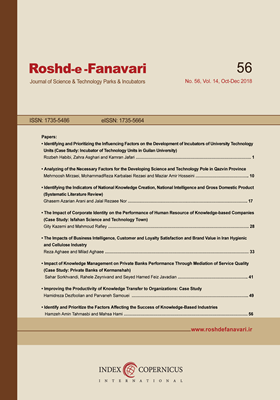Improving the Productivity of Knowledge Transfer to Organizations: Case Study
Subject Areas : Knowledge Managementparvaneh samoei 1 , hamidreza dezfoolian 2 *
1 -
2 -
Keywords: Knowledge TransferValuationCase StudyPottery IndustryProductivity,
Abstract :
Nowadays, knowledge is one of the greatest competitive advantages of organizations in the global economy and it is the most important factor in creating value in organizations. Therefor, it is imperative for any organization to acquire the knowledge needs. Organizational resource constraints do now allow the acquisition of all knowledge needs at the same time, therefore, by valuing and prioritizing the knowledge needs, one can act in such a way that the limited organizational resources were initially devoted to the most essential knowledge needs, thus benefiting from the resources in the best way. Accordingly, in the proposed model in this paper, after identifying all the industry’s knowledge, the knowledge requirements of the organization under study are extracted and according to the organization’s goals and conditions, suitable criteria, the required knowledge is prioritized. The SWOT Matrix is applied for knowledge need assessment. A case study has been carried out in the pottery industry and the results of its implementation have been investigated in a pottery workshop. The results of the need assessment led to the selection of 10 knowledge from 24 pottery industry knowledge which were valued by selecting five criteria and three sub-criteria and ranked according to their importance.
1- Doz, Y.L. The evolution of cooperation in strategic alliances: Initial conditions or learning processes? Strategic Management Journal, 17, (1996), 55–83.
2- Pasaribu, B. I., Afrianti, A., Gumilar, G.G., Rizanti, H.P., Rohajawati, S.; Knowledge Transfer: A Conceptual Model and Facilitating Feature in Start-up Business, Procedia Computer Science 116, (2017), 259–266.
3- Rony Dayan, Peter Heisig, Florinda Matos, Knowledge management as a factor for the formulation and implementation of organization strategy, Journal of Knowledge Management 21(2), (2017), 308-329.
4- Gao, Sheng; 2004, Understanding Knowledge Sharing Behaviour. Master’s Thesis, The Hong Kong University of Science & Technology, (2004).
5- Muthuveloo, R., Shanmugam, N., Teoh, A.P., The impact of tacit knowledge management on organizational performance: Evidence from Malaysia, Asia Pacific Management Review 22, (2017), 192-201.
6- Wei, Y., Miraglia, S.; Organizational culture and knowledge transfer in project-based organizations: Theoretical insights from a Chinese construction firm, International Journal of Project Management 35, (2017) 571–585.
7- Wang, S., Noe, R. A., Knowledge sharing: A review and directions for future research, Human Resource Management Review, 20 (2010), 115–131.
8- Huysman, M., de Wit, D., Knowledge management in practice. In Edwards, J. & Kidd, J. (Eds.) Knowledge Management Conference (KMAC 2000), Birmingham, UK, (2000).
9- Wang, S., Noe, R. A., Wang, Z.-M.; Motivating Knowledge Sharing in Knowledge Management Systems: A Quasi–Field Experiment; Journal of Management 40(4), (2014), 978-1009.
10- Liu, C., Chen, S. Determinants of knowledge sharing of e-learners. International Journal of Innovation and Learning 2(4), (2005), 434–445.
11- Kang, J., Rhee, M., Kang, K. H., Revisiting knowledge transfer: Effects of knowledge characteristics on organizational effort for knowledge transfer, Expert Systems with Applications 37 (2010), 8155–8160.
12- Primmer, E., Saarikoski, H. & Vatn, A.; An Empirical Analysis of Institutional Demand for Valuation Knowledge, Ecological Economics 152, (2018), 152-160.
13- Housel, T. J., Nelson, S. K., Knowledge valuation analysis-Applications for organizational intellectual capital, Journal of Intellectual Capital, 6(4), (2005), 544-557.
14- Schorcht, H., Nissen, V., Challenge knowledge valuation. Proceedings of I-KNOW ’08 and I-MEDIA '08, Graz, Austria, (2008).
15- Ahn, J., Chang, S., Valuation of knowledge: A business performance-oriented methodology. Proceedings of the 35th Hawaii International Conference on System Sciences, (2002).
16- Pyo, S., Identifying and prioritizing destination knowledge needs. Annals of Tourism Research 39(2), (2012), 1156–1175.
17- Wudhikarn, R., A Framework for prioritizing required knowledge, skills and competencies of cooperative students, International Journal of e-Education, e-Business, e-Management and e-Learning 3(2), (2013), 143-147.
18- Minbaeva, D., Pedersen, T., Björkman, I., Fey, C. F., Park, H. J., MNC knowledge transfer, subsidiary absorptive capacity, and HRM, Journal of International Business Studies 34(6), (2003), 586-599.
19- Winter, S. G., Knowledge and competence as strategic assets, In D. J. Teece (Ed.), The competitive challenge: Strategy for industrial innovation and renewal. New York, Harper & Row, (1987), 159-184.

